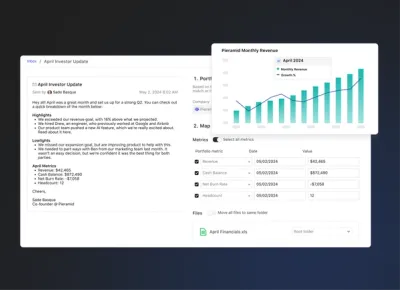
Raise capital, update investors and engage your team from a single platform. Try Visible free for 14 days.
Venture capital is relatively new. In the 80s and 90s venture capital was simply capital available to “tech” companies (e.g. silicon chips in the 90s). At the time, capital was enough of a differentiator for a VC fund to stand out. Since then, the market, and funding options available to startups, have exploded.
Y Combinator launched in the mid-2000s and began transforming the space. Since then name-brand VC funds have popped up throughout the country and the globe. Now, founders are looking for more from their investors (hiring help, future capital, leadership skills, technological help, etc.).
Related Resource: Seed Funding for Startups 101: A Complete Guide
One of the popular funding options and resources that has popped up over time is the incubator. As put by the team at Investopedia,
“An incubator firm is an organization engaged in the business of fostering early-stage companies through the different developmental phases until the companies have sufficient financial, human, and physical resources to function on their own.”
Related resource: Accelerator vs. Incubator: Key Differences and Choosing the Best Fit for Your Startup
What Do Incubators Do?
While different incubators will likely specialize in different aspects of business building, they generally help in all of the ways below.
Related resource: 10 Top Incubators for Startups in 2024
Provides Feedback & Assistance With Business Basics
Incubators are generally suited to extremely early product ideas or businesses. One of the areas they are the best fit to help is by providing feedback and covering business basics. This might include things like establishing your business, brand, distribution strategy, and more.
Introductions to Other Startups & Networking Opportunities
Generally, incubators have cohorts or classes of startups. This means that they are seeing hundreds of startups throughout their lifecycle. Incubators are a great way to find introductions to other startups, founders, and partners they might have worked with in the past.
Includes Necessary Equipment – Including High-Speed Internet
Historically, incubators have a physical office space for startups to leverage. This is an opportunity for startups to save on office rent and leverage the equipment and tools they need to succeed — internet, conference rooms, desk space, etc.
Access to Investors
Once you’ve worked your way through an incubator, chances are you are ready to hit the ground running on your business. One of the common ways to do this is by scaling strategies you worked on during the incubator. To help with this, many incubators have demo days or a network of investors they will be able to introduce you to for a future round of financing.
Related Reading: All Encompassing Startup Fundraising Guide
Connections to Strategic Partners & Other Service Providers
Another benefit of an incubator is the partners and service providers that they work with. Oftentimes, incubators work closely with large organizations or have individuals present with their expertise. For example, an incubator might bring in someone that is an expert in product-led growth and can help you set up your process and make introductions to potential hires. On the flip side, they generally offer discounts to service providers to help you get things started.
Types of Business Incubators
Incubators tend to be a proving ground for different startup ideas and products. Due to this, different types of businesses and organizations have incentives to launch an incubator. Check out some of the most common types of incubators below:
Academic Institutions
One of the most common types of institutions that use incubators is academic institutions — generally large universities. This is a great way to allow current undergraduate and graduate students to pursue different ideas and businesses they might have in mind. Universities can tap into their network of experienced professors to help students with all aspects of business building. Additionally, universities also offer a massive network of alumni.
Non-Profit Organizations
Another business that leverages incubators is non-profit organizations. Non-profits are generally trying to solve large problems that impact people across the globe. Because of this, the space generally requires innovation and new ideas to help tackle these problems. Non-profits turn to incubators to help fuel innovation in the space and uncover the next entrepreneurs suited to help.
Related Reading: Impact Investors and Fund Managers to Know
For-Profit Corporations
Of course, for-profit corporations are very common in the incubator space. Corporations are likely looking for growth and innovation in their market and space. While they likely have teams dedicated to this in-house they also look outside their organization for areas where they can innovate and expand. Corporations will use incubators to search for new ideas and products from entrepreneurs that are in the space and can help their business grow even further.
Venture Capital Firms
Another common business that uses incubators is venture capital firms. VC firms are dedicated to investing in startups. Because of this, they are incentivized to help the earliest stage startups incubate their idea. This allows them to invest at a later date and get a head start on the diligence process. VC firms also have built out networks and partners that help their VC fund portfolio companies which translates well to helping the companies in their incubator.
Related Reading: The 12 Best VC Funds You Should Know About
What’s the Difference Between an Incubator and an Accelerator?
Incubators and accelerators have both become synonymous with the startup space. While you might think they are similar or the same, they do have a number of differences. An incubator is built to help the earliest stage ideas develop their business expertise and determine if they have a viable business.
Related Reading: Why Most Accelerators Fail…and Why Yours Doesn’t Have To
An accelerator is best suited to help businesses that are a step further. As put by the team at TechTarget, “A startup accelerator is a business program that supports early-stage, growth-driven companies through education, mentorship and financing. Startups typically enter accelerators for a fixed period of time and as part of a cohort of companies. While accelerator programs can provide beneficial resources to organizations at all stages of development, most focus on those that are pre-revenue.”
This means that these companies already have a business model and product in place and are ready to hit the ground running on their revenue growth and product development.
Top Incubators for Startups
1. 1871

One of the largest tech incubators globally, 1871 supports over 400 startups through mentorship, educational programming, and networking opportunities. It offers a collaborative space and access to investors and corporate partners.
2. Betaworks
Betaworks invests, accelerates, and builds companies and projects from scratch — our focus right now is on AI and Augmentation, LLM's, NLP, web3 rails and applied machine learning.
3. Antler
Antler is a global startup generator and early-stage VC that is building the next big wave of tech. With the mission to turn exceptional individuals into great founders, Antler aims to create thousands of companies globally.
4. Entrepreneur First
Entrepreneur First stands out by prioritizing investment in individuals rather than established startups. This incubator gathers skilled talent from across the globe, helping them form teams and launch new ventures from the ground up. In 2024, Entrepreneur First remains a trailblazer in redefining the conventional incubator model, emphasizing a talent-first strategy that drives innovation right from the inception of a company.
5. DMZ
A global startup ecosystem, DMZ at Toronto Metropolitan University equips the next generation of tech entrepreneurs with the tools needed to build, launch and scale highly impactful startups. By providing connections to customers, coaching, capital and a community, DMZ’s world-leading incubator programs help innovators reach the next milestone in their entrepreneurial journey – whatever that might be. Through its award-winning programming, DMZ has helped 800+ startups raise $2.69 billion in capital and create 5,100+ jobs. Headquartered in Toronto, Canada, with globally-accessible programming, DMZ has a widely-recognized international presence with offices in Vietnam, India and the U.S., and partnerships across North America, Latin America, Africa and Asia. Learn more at dmz.to.
6. Idealab
Idealab is a business incubator providing capital, resources and advice for tech startups. Idealab continues to explore a range of technology frontiers. New models for improving the search experience are at the core of several companies currently growing inside of Idealab. Moving beyond the Internet, we have spawned companies with breakthrough technologies in robotics, renewable energy and automotive design and production among others. Idealab also continues to partner with leading venture capital firms and other strategic investors to provide the resources to maximize the potential of these companies.
7. TechNexus
We build ecosystems by finding, funding, and accelerating technology ventures in collaboration with entrepreneurs and enterprises. We invest globally in early stage companies through vertical focused funds backed by leading corporate partners and leverage those unique enterprise relationships post-investment to drive accelerated venture development.
Is an Incubator Right for You?
Incubators aren’t for everyone. If you’ve got an understanding of your business model and product, you are likely ready to skip over the incubator and hit the ground running on your business. To learn how you can take your business to the next level, subscribe to the Visible Weekly – we search the web for the best tips to attract, engage and close investors, then deliver them to thousands of inboxes every week. Subscribe here.






